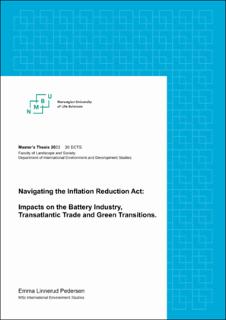| dc.contributor.advisor | Guri Bang | |
| dc.contributor.author | Pedersen, Emma Linnerud | |
| dc.date.accessioned | 2023-07-06T16:28:57Z | |
| dc.date.issued | 2023 | |
| dc.identifier | no.nmbu:wiseflow:6839549:54592020 | |
| dc.identifier.uri | https://hdl.handle.net/11250/3076810 | |
| dc.description.abstract | The Inflation Reduction Act (IRA), passed in August 2022, is a significant step towards climate and clean energy in the United States. While it aligns with domestic climate goals, concerns exist about its potential impact on global environmental initiatives and trade. The IRA's provisions targeting China's dominance in the battery supply chain could disrupt the European market and challenge the EU's competitive advantage in green industries. The thesis aims to analyse the IRA's impact on transatlantic cooperation in global climate governance and the green energy transition, examining its alignment or conflict with the European Green Deal. It also explores the IRA's protectionist approaches and their implications for a sustainable supply chain. The potential impact on transatlantic trade and the response of the EU are essential considerations. The research aims to contribute to understanding the global battery market and the IRA's effects on competition towards green transitions. | |
| dc.description.abstract | | |
| dc.language | eng | |
| dc.publisher | Norwegian University of Life Sciences | |
| dc.title | Navigating the Inflation Reduction Act: Impacts on the Battery Industry, Transatlantic Trade and Green Transitions. | |
| dc.type | Master thesis | |
| dc.description.localcode | M-IES | |
